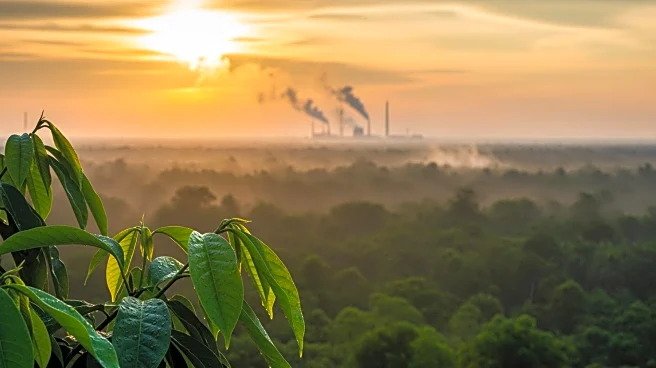What's Happening?
The COP30 conference in Brazil concluded with a compromise on climate change measures, pledging increased financial support for vulnerable countries but lacking a clear plan to phase out fossil fuels. The conference aimed to address climate-related issues
such as extreme weather and sea level rise, with countries presenting their national climate plans. Despite efforts to introduce a detailed guide for phasing out fossil fuels, the final agreement fell short of expectations, leading to mixed reactions from participants. Brazil plans to create its own roadmap for fossil fuel reduction, with some countries agreeing to meet next year to discuss further actions.
Why It's Important?
The outcome of the COP30 conference highlights the challenges of achieving global cooperation on climate change. The lack of a concrete plan to phase out fossil fuels is a setback for efforts to mitigate climate change impacts. Vulnerable countries, particularly small island states, welcomed the financial support but expressed concerns over the slow progress. The compromise reflects the difficulty in balancing economic interests with environmental goals, underscoring the need for continued dialogue and action to address climate change effectively.
What's Next?
Countries that agreed to Brazil's roadmap will reconvene next year to discuss the phase-out of fossil fuels, although the agreement lacks the weight of a formal COP decision. The focus will be on translating the conference's commitments into tangible projects that protect lives and livelihoods. The ongoing dialogue will be crucial in advancing climate change mitigation efforts and ensuring that vulnerable populations receive the necessary support to adapt to environmental changes.
Beyond the Headlines
The conference's setting in the Amazon rainforest highlighted the urgency of climate action, with participants experiencing firsthand the effects of climate change. Indigenous groups and civil society played a significant role in advocating for stronger measures, emphasizing the importance of including diverse voices in climate negotiations. The compromise reached at COP30 reflects the complexities of multilateralism and the need for inclusive and transparent decision-making processes.
















